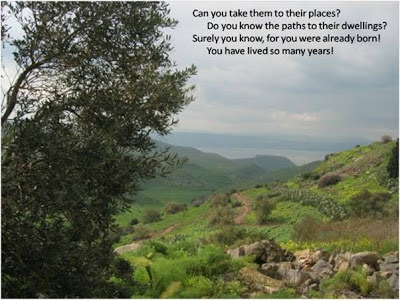Readings for this week
Monday: Ezekiel 13
Tuesday: Ezekiel 14
Wednesday: Ezekiel 15
Thursday: Ezekiel 16
Friday: Ezekiel 17
Saturday: Ezekiel 18
Sunday: Ezekiel 19
Tuesday: Ezekiel 14
Wednesday: Ezekiel 15
Thursday: Ezekiel 16
Friday: Ezekiel 17
Saturday: Ezekiel 18
Sunday: Ezekiel 19
Introduction to Ezekiel 13-19
Chapters 13-14
In chapters 13-14, Ezekiel gives the people the sign of the whitewashed wall. Ezekiel compares false prophets to people who cover up a flimsy wall with whitewash and say everything’s going to be okay. He says, “Woe to the false prophets who make things up from their own imaginations! The people will confront them when the walls collapse!”
Ezekiel says that God refuses to answer Judah’s elders because they’ve “set up idols in their hearts,” and he tells the people that God said that He would send four judgments upon the land: sword, famine, wild beasts, plague. And he adds that “even if Noah, Daniel, and Job” were living in the land, “they could only save themselves,” and not the rest of the people from God’s coming judgment.
Ezekiel says that God refuses to answer Judah’s elders because they’ve “set up idols in their hearts,” and he tells the people that God said that He would send four judgments upon the land: sword, famine, wild beasts, plague. And he adds that “even if Noah, Daniel, and Job” were living in the land, “they could only save themselves,” and not the rest of the people from God’s coming judgment.
Chapter 15
In chapter 15, Ezekiel tells the parable of the useless vine. Jerusalem is portrayed as a useless vine. He says that wood is used to make furniture… but what are vines used for other than kindling? He says that Jerusalem has been burned before and she will be burned again just like the useless vine that she is.
Chapter 16
In chapter 16, Ezekiel tells the parable of the adulterous wife. God says through him:
Jerusalem, you were born in the land of the Canaanites. Your father was an Amorite and your mother a Hittite. Nobody took care of you when you were born, but you were thrown out into a field and left to die. I passed by and saw you kicking in your blood and I gave life to you and made you grow.
You grew up and became a woman, but you were stark naked. When I saw that you were old enough for love I spread the corner of my garment over you and covered your nakedness and we entered into a marriage covenant together. I bathed you and clothed you and covered you with jewelry. You were very beautiful and became a famous queen.
But you trusted in your beauty and used your fame to become a prostitute. You made idols and had sex with them. You used the gifts I gave you as offerings to your idols. You slaughtered the children we had together and offered them to your idols. You forgot that I rescued you as a child wallowing in your own blood. You “degraded your beauty” and “spread your legs to anyone who passed by.” You enjoyed the “large genitals” of the Egyptians and “even the Philistines were shocked by your lewd conduct!” You weren’t even satisfied when you made love to the Assyrians and Babylonians. You were unlike any other prostitute because you refused to accept payment and instead paid others to sleep with you.
You have made me furious! Because you have betrayed me and killed my children, I am going to gather all your lovers together to watch as I strip you naked. Your lovers will then knock down all your idols and destroy everything you have built. Your lovers will steal all your jewelry and then stone you and hack you to pieces. Then will my rage subside.
You were just like your father and mother, the Amorites and Hittites, who despised you and threw you out to die. You were just like your older sister Samaria and your younger sister Sodom – but worse!
“Now this was the sin of your sister Sodom: She and her daughters were arrogant, overfed and unconcerned; they did not help the poor and needy. They were haughty and did detestable things before me. Therefore, I did away with them as you have seen. Samaria did not commit half the sins you did.”
However, I will restore the fortunes of Sodom and Samaria and their daughters, and I will restore you and your daughters as well. Yet I will remember the covenant I made with you in the days of your youth, and I will establish an everlasting covenant with you. And when I provide for you your salvation, you will cover your mouth in silence.
Jerusalem, you were born in the land of the Canaanites. Your father was an Amorite and your mother a Hittite. Nobody took care of you when you were born, but you were thrown out into a field and left to die. I passed by and saw you kicking in your blood and I gave life to you and made you grow.
You grew up and became a woman, but you were stark naked. When I saw that you were old enough for love I spread the corner of my garment over you and covered your nakedness and we entered into a marriage covenant together. I bathed you and clothed you and covered you with jewelry. You were very beautiful and became a famous queen.
But you trusted in your beauty and used your fame to become a prostitute. You made idols and had sex with them. You used the gifts I gave you as offerings to your idols. You slaughtered the children we had together and offered them to your idols. You forgot that I rescued you as a child wallowing in your own blood. You “degraded your beauty” and “spread your legs to anyone who passed by.” You enjoyed the “large genitals” of the Egyptians and “even the Philistines were shocked by your lewd conduct!” You weren’t even satisfied when you made love to the Assyrians and Babylonians. You were unlike any other prostitute because you refused to accept payment and instead paid others to sleep with you.
You have made me furious! Because you have betrayed me and killed my children, I am going to gather all your lovers together to watch as I strip you naked. Your lovers will then knock down all your idols and destroy everything you have built. Your lovers will steal all your jewelry and then stone you and hack you to pieces. Then will my rage subside.
You were just like your father and mother, the Amorites and Hittites, who despised you and threw you out to die. You were just like your older sister Samaria and your younger sister Sodom – but worse!
“Now this was the sin of your sister Sodom: She and her daughters were arrogant, overfed and unconcerned; they did not help the poor and needy. They were haughty and did detestable things before me. Therefore, I did away with them as you have seen. Samaria did not commit half the sins you did.”
However, I will restore the fortunes of Sodom and Samaria and their daughters, and I will restore you and your daughters as well. Yet I will remember the covenant I made with you in the days of your youth, and I will establish an everlasting covenant with you. And when I provide for you your salvation, you will cover your mouth in silence.
Chapter 17
In chapter 17, Ezekiel tells the parable of two eagles and a vine.
There once was a great and powerful eagle that came to Lebanon. He broke the topmost shoot off of a great cedar and carried it to a land of merchants where he planted it. A tree grew up and spread its branches towards the eagle of the sky. Another great and powerful eagle came along. The tree spread itself out towards that other eagle. Will the tree live? No! It will be scorched by the east wind.
What does this parable mean?
First eagle = Babylon
The cedar = Jerusalem
The top shoot = royal family of Jerusalem
Transplanted shoot = exiled royal family
Second eagle = Egypt
The scorching east wind = Babylon’s revenge
And he says, “All the trees of the forest will know that I the LORD bring down the tall tree and make the low tree grow tall. I dry up the green tree and make the dry tree flourish.”
There once was a great and powerful eagle that came to Lebanon. He broke the topmost shoot off of a great cedar and carried it to a land of merchants where he planted it. A tree grew up and spread its branches towards the eagle of the sky. Another great and powerful eagle came along. The tree spread itself out towards that other eagle. Will the tree live? No! It will be scorched by the east wind.
What does this parable mean?
First eagle = Babylon
The cedar = Jerusalem
The top shoot = royal family of Jerusalem
Transplanted shoot = exiled royal family
Second eagle = Egypt
The scorching east wind = Babylon’s revenge
And he says, “All the trees of the forest will know that I the LORD bring down the tall tree and make the low tree grow tall. I dry up the green tree and make the dry tree flourish.”
Chapter 18
The people who had been exiled began to complain that the situation they were in was not their fault. They claimed that they were suffering for the sins of their ancestors. God told Ezekiel to tell the people that they would no longer quote the proverb, “The parents ate sour grapes, and the children’s teeth are set on edge.” Ezekiel told them that God does not punish children for the sins of their parents or punish parents for the sins of their children. He also told them that God would forgive someone who started out bad but later repented, and that God would not forgive someone who started out good but later turned to evil.
Chapter 19
Chapter 19 is a lament over Judah’s kings. Ezekiel compared Judah to a lioness with two cubs.
First cub = Josiah’s son Jehoahaz who reigned 3 months before being killed by Pharaoh
Second cub = Josiah’s grandson Jehoiachin who was exiled by the Babylonians
And now we’re stuck with lousy Zedekiah…
























































